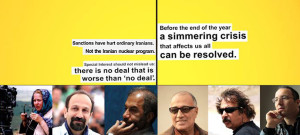 Six prominent Iranian filmmakers have put their names and faces to a fancy-looking social media campaign urging world powers to agree to a deal concerning Iran’s nuclear programme before the 24 November deadline for the ongoing negotiations in Geneva.
Six prominent Iranian filmmakers have put their names and faces to a fancy-looking social media campaign urging world powers to agree to a deal concerning Iran’s nuclear programme before the 24 November deadline for the ongoing negotiations in Geneva.
The ‘improved offer’ the celebrities are making – on behalf of the Iranian government, it appears – is a nuclear programme frozen at the current size and scope and allowing daily inspections by the International Atomic Energy Agency (IAEA) of Iran’s nuclear facilities.
The US and EU are demanding that Iran scales back its nuclear programme permanently so as to eliminate any possibility of developing nuclear bombs in the future.
Who’s behind the campaign?
According to the BBC, the campaign appears to be backed by Iran’s foreign ministry.
The directors featured in the campaign include M.Mehdi Asgarpour, Rakhshan Bani-E’temad, Asghar Farhadi, Asghar Farhadi, Majid Majidi and Reza Mirkarimi, who are described as “luminaries of the Iranian cinema.” But many of their award-winning films have been banned in Iran.
Yet, despite their troubled relationships with the Iranian regime, they have somehow agreed to be used in a campaign that will only legitimise the disastrous adventures of Iran’s Supreme Leader Ayatollah Ali Khamenei and Sepah Pasdaran (the Iranian Revolutionary Guards).
Sensational
Under the tag line “There is no deal that is worse than no deal,” the campaign employs a mixture of humanitarian sensationalism and a stick-and-carrot approach.
As populist tabloids and politicians often do, the campaign’s webpage (http://no2nodeal.com) cries that the economic crisis caused by the sanctions “affects us all” and “can be resolved before the end of this year.” “Sanctions have hurt ordinary Iranians,” it adds, “not the Iranian nuclear program.”
It is true that the Iranian economy has been suffering a great deal in the last few years – the inflation rate has more than tripled between 2009 and 2014 and almost a third of all families in Iran (31 per cent) now live below the poverty line.
But this cannot be all attributed to the sanctions. There is also economic mismanagement and corruption, and the fact that large sectors of Iran’s economy have been taken hostage by Khamenei and Sepah Pasdaran and their friends.
Add to that the Iranian regime’s costly military interventions in Iraq, Syria, Lebanon, Yemen and elsewhere. Billions and billions of Tomans have been spent on weapons and militias sent to these countries to support unpopular dictatorships. And this, like the military nuclear programme, has placed an enormous and unnecessary burden on the Iranian economy.
To give you an example, while phasing out energy subsidies, Iran has been sending millions of barrels of oil to the Syrian regime at discount prices, paid for by Iranian credit. While winding down social assistance payments to nearly 60 million Iranians, Iran has been sending millions of tonnes of food and cash to the Syrian regime. It just doesn’t make sense.
Stick and carrot
In addition to this humanitarian cry, the directors urge world powers to accept their offer because “a possible deal” would allow daily inspections by IAEA of Iran’s nuclear facilities. This, it is claimed, would prevent the production of plutonium and strip Iran of the possibility of producing nuclear weapons.
A “no deal”, on the other hand, means that the inspections will not be allowed and “nuclear capability” will remain “possible.”
The implicit, carefully worded message here is that, if you don’t lift the sanctions, we will carry on with our military nuclear programme.
A better approach
While no one should be against lifting the sanctions and improving the economic relations between Iran and any other country, one cannot ignore the fact that a big part of the subsequent economic gains under the current conditions will be wasted on enabling human rights abuses in Iran as well as war crimes and crimes against humanity in Syria, Iraq and elsewhere.
That’s why Naame Shaam has been demanding that the nuclear negotiations and sanctions are linked to the Iranian regime’s disastrous interventions in these countries.
We believe that this is the only realistic opportunity at the moment to push for a fundamental shift in Iran’s foreign policy and help ordinary Iranians for real.
For more on Naame Shaam’s position and demands in this regard, see this open letter from July 2014 to the US and EU foreign ministers regarding the Iranian nuclear talks.
 English
English  فارسی
فارسی  العربية
العربية 




 On Twitter
On Twitter